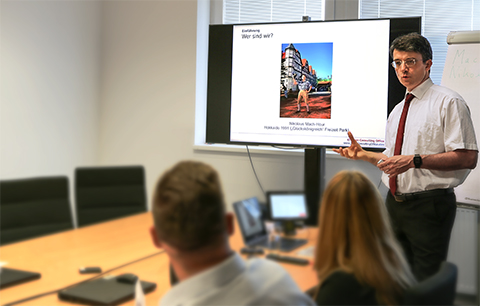How to overcome 'the invisible wall': Intercultural training opens up new perspectives in Japanese-European business exchange

It’s the start of an all-day training event in Ratingen, a small town near Düsseldorf, where the EMEA headquarters of NGK SPARK PLUG is based. A group of recently recruited employees is attending the training today. At the end of the session, amongst other topics they’ll have learned about the significance of being polite, the role business cards play and how to interpret a Japanese smile. They’ll also know why actively checking whether you have been understood is crucial. Overall, these learning points will lead to more effective communications with, and a better understanding of, their counterparts from the Far East. Ultimately, learning from each other is key.
But how do the difficulties in understanding arise?
“‘Kabe’, or ‘The Wall’, is not only caused by insufficient language skills, but also by differing non-verbal signs. To make it even more complicated, sometimes the same word has a different meaning in another language,” explains Nikolaus Mach-Hour, who has worked with the Japanese for most of his life and provided training in over a hundred Japanese companies. The experienced trainer gives an example: “‘Hai’, the Japanese word for ‘yes’, doesn’t necessarily mean one agrees or even understands. It could just mean ‘I am listening’,” he explains.
Alternating between case studies, videos, role-plays, group discussions and lectures, the participants learn strategies to better understand their Japanese colleagues, as well as interactively testing their newly-acquired knowledge on the spot.

In a practical role play, the participants learn how to correctly accept business cards (thank the presenter by bowing while holding the card with both hands, reading out the name). They also discover that, when in contact with Japanese colleagues or partners, a smile never hurts, even in tough negotiations. “Smiling is considered a sign of doing your best to maintain harmony and avoid escalation,” explains Nikolaus.
At the end of the training, the new employees are keen to put the learning points into practice. Benedikt Rolfes, one of the participants, says: “This seminar has broadened my understanding of Japanese culture, but it will be an ongoing process to make that understanding second nature.”
One thing everyone agrees on: even though it was a long day, it wasn’t boring for a moment. Benedikt confirms: “The trainer was great. He managed to facilitate understanding between two different cultures without blaming one or the other. Also, the training was very interactive. We discussed business examples where we’ve encountered issues caused by language barriers, and what could have been done to improve the situation.”
And as Chihiro Imanari, a Japanese employee who also attended one of the training sessions, puts it: "Our intercultural seminars enable both sides – Japanese and European colleagues – to conquer cultural and communications challenges and improve our everyday work."
Ultimately, it’s all about ‘building bridges’. A perfect complement to the ‘EMEA motto’ of NGK SPARK PLUG: ‘WE TOGETHER’!
Tips from Japan expert Nikolaus Mach-Hour: - Consciously adapt your communication style to that of your counterpart. |
 Niterra Blogs
Niterra Blogs








